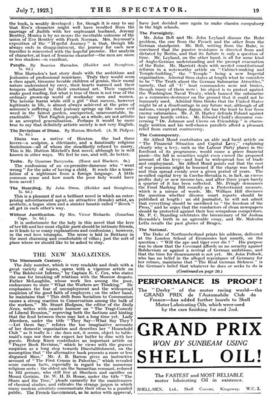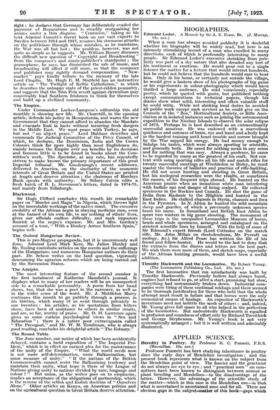The National.
The Duke of Northumberland prints his address, delivered at the London School of Economics last month, on the question : "Will the ape and tiger ever die ? " His purpose was to show that the Covenant affords us no security against Bolshevism or against a revival of German ambitions, and that the time for disarmament is not yet. Mr. John Pollock, who has no belief in the alleged repentance of Germany for her crimes, maintains that "The Real German Sickness" is the German's belief that whatever he does or seeks to do is (Continued on page 20.)
right ; he declares that Germany has deliberately evaded the payment of Reparations and is steadily reorganizing her armies under a thin disguise. "Centurion," taking as his text Admiral Consett's recent book on our vast exports to Sweden between 1914 and 1917, resumes his strenuous attacks on the politicians through whose mistakes, as he maintains, the War was all but lost ; the problem, however, was not quite so simple as he suggests. Mr. William Boosey discusses the difficult new question of " Copyright and Broadcasting" from the composer's and music-publisher's standpoint ; the gramophone, he says, has diminished the sale of music, and broadcasting will affect it still more, so that the composer and publisher may rightly demand compensation. " New- market " pays kindly tribute to the memory of the late Lord Chaplin. Mr. Hugh E. M. Stutfield has an instructive article on "The Twilight of Kettle Catholicism," in which he describes the unhappy state of the priest-ridden peasantry, and suggests that the Simi Fein revolt against clericalism Tay conceivably lead Southern Irishmen to think for themselves and build up a civilized community.















































 Previous page
Previous page